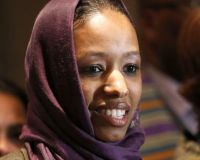ANALYSIS If Muslims and Christians worship a different God, what is the right response?
by - 3rd February 2016
 THE RECENT suspension of a tenured lecturer at one of America’s foremost Christian colleges over her views on Islam is a symptom of a sensitive fault line among evangelicals.
THE RECENT suspension of a tenured lecturer at one of America’s foremost Christian colleges over her views on Islam is a symptom of a sensitive fault line among evangelicals.
The question of whether the God of the Qur'an is the same as the God of the Bible is an important and complex one, but in the case of Larycia Hawkins, it has become politicized, distorting the issues.
Christians are denouncing each other as ‘bigots’ over the vexed issue.
Wheaton suspended Larycia Hawkins – their first ever black tenured teacher - on paid leave while they 'explore theological implications of her recent public statements concerning Christianity and Islam'.
She had written a facebook post the day after the San Bernardino terrorist massacre that states: ‘I stand in religious solidarity with Muslims because they, like me, a Christian, are people of the book, and as Pope Francis stated last week, we worship the same God.’
Her comments were described as ‘innocuous’ even by Wheaton’s own Provost, according to a leak reported by Time magazine.
But Hawkins’ stance went viral after she took to wearing the hijab to church throughout Advent.
 The affair became further inflamed following the published remarks of controversial Yale theology don, Miroslav Volf, a Croatian Protestant and specialist in Islam, whose book Allah is reviewed here.
The affair became further inflamed following the published remarks of controversial Yale theology don, Miroslav Volf, a Croatian Protestant and specialist in Islam, whose book Allah is reviewed here.
Now Wheaton is examining whether her theology is compatible with the college's Statement of Faith, which must be endorsed by all its teachers.
The college asked Larycia Hawkins to clarify her views – which to date she has declined to do - and has begun a ‘termination review process’ (described by Time as an ‘expulsion trial’.)
The decision has led to protests on the Wheaton campus.
Volf’s piece in the Washington Post was withering about Wheaton, accusing them of ‘enmity’ towards Muslims, dressed up as dogma.
His argument was as follows:
Those who claim that Muslims and Christians do not worship the same God base this upon Muslims' denial of the Trinity and the Incarnation.
However Jews deny the Trinity and the Incarnation, and Christians down the ages have not claimed that Jews worship a different God.
Therefore those who do not accept the 'same God’ thesis must be motivated by enmity, not reason.
There are two problems with this reasoning. One is the premise. Wheaton has not itself stated that it objects to the 'same God' thesis on the basis of Muslims' beliefs about the Trinity and the Incarnation.
Volf also leaps from pointing out a supposed inconsistency in the reasoning of Christians to maligning their motives.
Yet Wheaton are perfectly within their rights to examine the issues at stake according to clearly established principles.
The best and strongest reason for rejecting the 'same God' thesis is not Muslims' disbelief in the Trinity or the Incarnation. It is that the Qur'an projects a different understanding of God from the Bible’s. As Denny Burk of the Southern Baptist Theological Seminary in Louisville put it ‘our books are very different’.
The theological differences between the Bible and the Qur’an are subtler and more fundamental than contrasting beliefs about the Trinity and Incarnation.
For example, in stressing God’s transcendence, the Qur’an lacks a theology of God’s presence.
Eminent Orthodox Jewish theologian Michael Wyschogrod has observed that the Christian doctrine of the Incarnation was grounded upon the fundamentally biblical – and very Jewish – concept of the indwelling of God’s Shekinah presence with his people. Although the Arabic term sakīnah – borrowed from Hebrew shekinah, perhaps via Syriac – appears six times in the Qur’an, it has been repurposed to mean ‘tranquillity’, and the concept of the personal presence of God is not comprehended by Quranic theology.
It is not just that Islam rejects the Incarnation of Jesus: unlike Judaism, its scripture offers no basis for incarnational theology.
Scripture
Judaism differs from Islam in its relationship to Christianity in two profound respects, which bear on the ‘same God’ issue.
First, Christians and Jews share scripture. Judaism bases its understanding of God on its Bible, which was the Bible of Jesus and became the ‘Old Testament’of Christians. This is not the case with Islam. Muslims do not base their theology on any part of the Bible. Indeed mainstream Islam rejects the authority of the Bible as corrupt, with reasons clearly stated in the Qur'an.
Second, Jesus was a practicing Jew, and so were his disciples, so it would be absurd to state that the God of the faith Jesus practiced is different from the Christian God.
This same observation does not apply to Islam. Muhammad was never a practicing Jew nor a practicing Christian, and, according to Muslim tradition, the large majority of his companions came to Islam out of paganism. This context has profoundly shaped the Qur’an and its understanding of God.
Volf vilifies Wheaton's leaders – and by implication all Christians – who disagree with him about the 'same God' thesis. He attributes bigotry, fear-based enmity and lack of love to them.
About 'those who insist that Christians worship an altogether different God than Muslims', he makes the statement that 'instead of wanting to "end" Muslims' he wished 'they would seek to embrace them in the name of Christ.'
Rhetoric
Volf implies that Christians who disagree with the 'same God' thesis have a desire to fight Muslims, rather than love them. (The culpable reference to 'ending' Muslims was to Jerry Falwell Jr's call to students at a Christian college to wear weapons in case a terrorist attack took place on their campus.)
Such incendiary rhetoric incites enmity of its own – in this case of those who disagree with Volf's own views on Allah.
The question of whether the God of the Qur'an is the same as the God of the Bible is an important and complex one. It is reasonable for Wheaton to inquire into whether the view that they are the same is consistent with its Statement of Faith.
Christians do need to consider carefully to what extent the God of the Bible and the God of the Qur’an are the same or different. This is an inquiry with far-reaching implications. However it is not helpful to paint as haters those who disagree with one position or another.
Larycia Hawkins’ statement, and her action of solidarity in donning a hijab for Advent, were motivated by an intense and admirable desire to show solidarity with those Muslims, particularly Muslim women, who have been marginalized by prejudice and hatred.
But it is a different matter, in the name of love, to demand acceptance of the ‘same God’ thesis.
Christians are called to love others whether they worship the same God or not. Jesus never said ‘Love only those who believe in the same God’.
NOTE The Qur'an's view of the Bible
Muslims ARE taught to accept the ‘books’ of the biblical faiths: for example in Q29:46.
BUT
a) The Quran states that the People of the Book have corrupted their scriptures. So what they have now is no longer what came from God.
It says thatJews deliberately alter (Q2:42; Q3:78; Q5:13, 41), conceal (Q2:42,76; Q6:91), and forge (Q2:79) Allāh’s words; pretend not to recognize the Messenger’s Book as coming from Allāh (Q2:101); and call Allah’s signs (or verses) a lie (Q62:5):
'… a group of them has already heard the word of Allāh, (and) then altered it after they had understood it – and they know (they have done this) …' (Q2:75).
b) God has abrogated previous revelations anyway. The People of the Book must heed the Qur’an (See Q13:16):
'For every (period of) time (there is) a written decree. Allāh blots out whatever he pleases, and He confirms (whatever He pleases). With Him is the mother of the Book' (Q13:38-39).
c) There is a ‘mother of the Book’ (i.e. of all books) in heaven. The Qur’an is a clear setting forth of this. So if you want to know what of value is in the Bible, read the Qur’an.
The Qurʾān is called a ‘distinct setting forth of the Book’ (Q10:37); and the Bible is said to be ‘in the mother of the Book’ (Q43:3-4; cf Q56:78, Q85:22).
